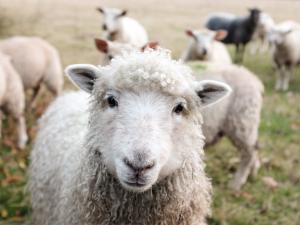Aside from Easter, this Sunday is kind of a big deal for our congregation. The sermon has to be about the Good Shepherd, and sometimes there’s a potluck, or a cake, and nicer than usual flowers. It’s our name day—we’re The Anglican Church of the Good Shepherd. Though a lot of those words are hard to spell. The new sign had to be sent back for correction, for example, because the church is not called “Angelican Church of the Good Shepherd.” And once a company trying to sell us pens or key rings or something sent some samples that said “Church of the Godd Shephard.” Nobody really knows what “Anglican” is—why can’t it be “Angelican?” And also, what even is a shepherd? There are none around here. It’s weird to have to reach down into some ancient past to figure out what the fuss is all about. While you ponder the matter, watch this most excellent clip that wins the internet forever and ever amen.
Anyway, this morning we are all inside, the sheep scattered all over town, hidden inside of our houses, having to mutter over and over ‘The Lord is my shepherd” because the collective sense of being “sheep” with a Shepherd is radically diminished when you can’t see all the rest of the flock. Sheep aren’t meant to be alone. Indeed, when a sheep finds him or herself alone, as all the texts in the gospels explain, the Shepherd is in a bad way, having to leave all the other sheep standing around to go off and find the one. Jesus is not just my shepherd, he is the Good Shepherd of all the sheep together.
And yet, there it is, the very first line of the psalm—The Lord is my Shepherd—and then, in another complete overturning of the state of all things, “I shall not want.” Neither collectively, nor individually, the flock nor the single lonely sheep shall lack anything. Which is one of those curious announcements that the Bible makes that nobody can even imagine to be true. Everybody in the entire cosmos experiences a deep lack, both subjectively and objectively. You can always look outside yourself at someone else’s life and see that he doesn’t have everything he needs or would like, that she could sure use some more money or a better set of relationships. Then look inside your soul and around at your kitchen cupboards. Apparently, for example, nobody could buy yeast this week. In a global pandemic, when the only thing that restrains the soul as it teeters over the precipice of despair is being able to bake round, crusty, golden loaves of bread, if not having yeast doesn’t count as a “want” I would say that almost nothing does.
Lack, I think, is the singular characteristic of being human. It’s the kind of thing that binds all people everywhere together into one common flock. It’s either material or spiritual, but it’s always there. Indeed, one of the tragedies of being alone is having the subjective experience of need intensified. When you are alone or feel alone, the keen personal internal reality of lack can be sharp, like a shard of glass embedded too far under the skin to extricate.
Sheep-like, then, in order to avoid or dull the sensation of lack, we wander around the world trying to remediate it, or otherwise get whatever it is we want. We and I, you and me. No one is exempt. Social media is such a help here, I think. My Facebook ads seem poignantly useful right now. All kinds of strange gadgets are appearing in my feed, like a micro-plane shaped like a pastry cutter, and there’s that horrible new “care” emoji, surely sprung fully formed out of the soul of Mark Zuckerberg, whose anxious grasping gaze is enough to give me nightmares every night of the week. Maybe if I do use the “care” emoji the world will really come together as one and all the bad things will go away, and we’ll all want for nothing ever again.
Or there’s Jesus, who meets my need in the worst kind of way—with himself. That’s the trouble. The lack is deeper than a bad economy or being lonely or losing someone you love. The lack goes all the way down to the core of the person, each person, and then, when you join all those wanting people together, it’s terrible, like Twitter terrible. But Jesus, the Good Shepherd, who provides for his sheep in all the strangest kinds of ways, is able to deal with the flock as a whole, and every single sheep by herself, in the same moment. He can lead the sheep where he wants them to go, even if, at the outset, they can see that it is going to be absolutely disappointing. And he can go off and drag a single sheep back into the group, however many times it needs to be done. He can rescue and feed them. He can lead and comfort them.
First and foremost by “laying down his life,” by offering himself as the food, the water, the wine, the lamb, the room, the light, the deep satisfying truth, the place to go.
Sheep are peculiarly unable to see what it is that will make them happy. They look around at each other scampering around the pasture and think that some other sheep should deliver himself up as food, shelter, and life. Or they look over the fence at a different pasture and figure that someone—probably the shepherd—is lying to them. Or they gorge on pie instead of grass and get sick. They wander around angry and miserable, trying to be ok, seeing that they are not ok, and then getting mad at the shepherd.
This is why all the things that the shepherd does are so directive—making, leading, feeding. All these actions are contained within himself. He is both the provider and the provender. He feeds and is fed upon, by all the sheep—each by themselves, and all of them together.
He will do it this morning, even though none of us are having it the way we “want.” He will be enough, even as we stagger around, bleating and butting each other, breaking down parts of the fence, galloping headlong for the cliff. He can handle it. He has already and will go on. So, sit on your wretched couch this morning, and watch your miserable tiny screen, and go to him with all your troubles, all your lack, all your woe. He is your Shepherd, even though he is mine also.
See you online!












